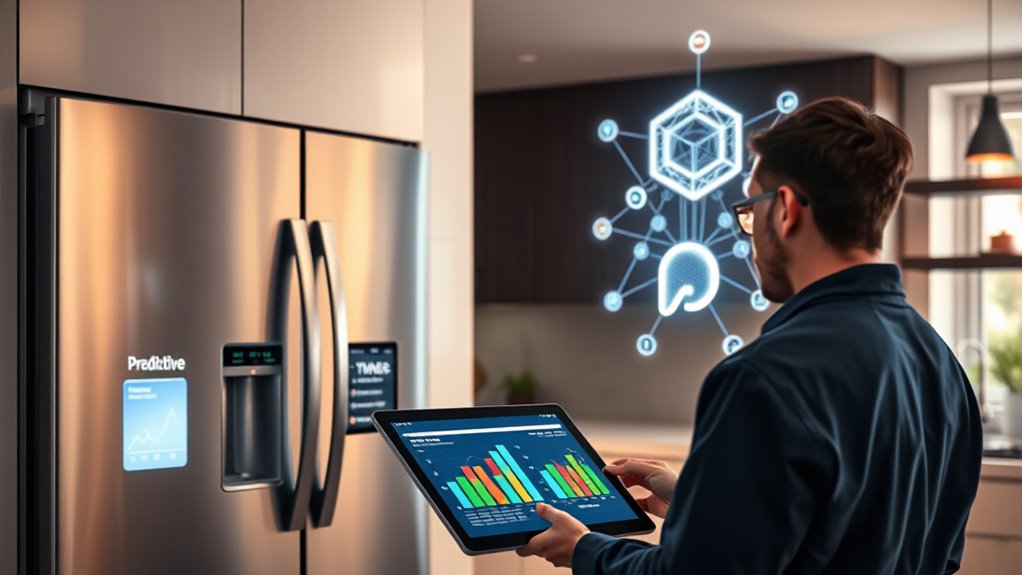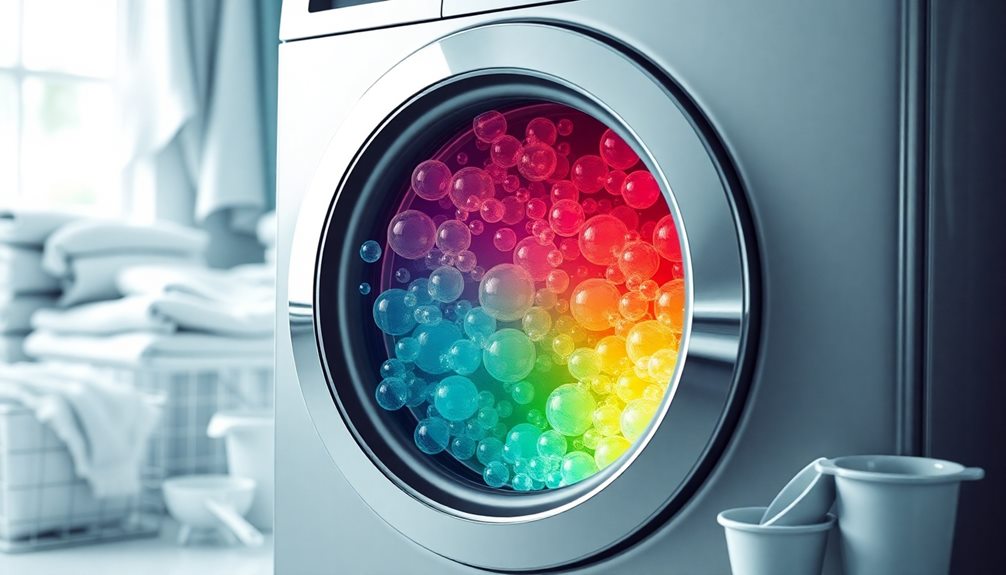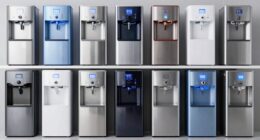AI plays a crucial role in predictive appliance maintenance by analyzing sensor data in real-time to forecast failures and spot issues early. It monitors performance metrics like temperature, vibration, and energy use to detect wear and potential malfunctions. This helps you avoid unexpected breakdowns, reduce repair costs, and extend your appliances’ lifespan. If you continue exploring, you’ll discover how AI makes these benefits even more effective and easier to implement in your home.
Key Takeaways
- AI analyzes sensor data to detect early signs of appliance failures, enabling proactive maintenance.
- It uses machine learning models to forecast future performance and identify potential malfunctions.
- AI continuously learns from operational data, improving prediction accuracy over time.
- It automates diagnostics, reducing human intervention and minimizing false alarms.
- AI tailors maintenance strategies by considering environmental and regional factors for better appliance management.
Understanding Predictive Maintenance and Its Benefits

Predictive maintenance is a proactive approach that uses data and analytics to forecast equipment failures before they happen. By monitoring machine performance in real-time, you can identify patterns indicating potential issues, allowing you to schedule repairs before costly breakdowns occur. This method reduces downtime, extends the lifespan of appliances, and decreases maintenance costs. Instead of waiting for appliances to fail, you gain the ability to plan maintenance activities efficiently. This approach often involves analyzing support hours for various appliances to ensure timely assistance when needed. Additionally, leveraging performance upgrades, such as tuning or part replacements, can optimize appliance operation and prevent unexpected failures. Understanding common issues in appliances further enhances the effectiveness of predictive strategies. Incorporating preventive measures based on data analysis can further reduce the likelihood of unexpected breakdowns, ultimately saving resources. Overall, it empowers you to maintain appliances more effectively, saving time and money while improving performance and longevity.
How Artificial Intelligence Enhances Appliance Monitoring

Artificial intelligence transforms appliance monitoring by enabling systems to analyze complex data patterns quickly and accurately. You benefit from real-time insights that help detect issues early, reducing downtime and preventing costly repairs. AI-powered monitoring systems continuously learn from operational data, improving their accuracy over time. They can identify subtle signs of wear or malfunction that might go unnoticed by humans. Here are some ways AI enhances this process:
- Detects anomalies before failures occur
- Provides real-time alerts for maintenance needs
- Tracks appliance performance trends over time
- Automates diagnostics with minimal human input
- Reduces false alarms by refining detection algorithms
- Incorporates continuous learning to adapt to evolving appliance behavior
- Enhances predictive maintenance strategies by forecasting potential issues before they impact functionality
- Utilizes sensor data analysis to monitor appliance health more effectively
- Improves algorithm precision through ongoing data refinement, leading to more reliable diagnostics
- Leveraging regional data can help tailor maintenance predictions based on local usage patterns and environmental factors
This proactive approach keeps your appliances running smoothly and efficiently, saving you time and money while increasing overall reliability.
Types of Data Collected for AI-Driven Diagnostics

To make accurate predictions, AI systems gather various types of data from appliances. You’ll see sensor data like temperature, vibration, and pressure, which reveal real-time conditions. Additionally, operational performance metrics and maintenance history records help identify patterns and potential issues before they escalate. Incorporating Kia Tuning insights can further optimize predictive maintenance strategies by understanding specific performance modifications.
Sensor Data Types
Sensor data for AI-driven diagnostics come in various forms, each providing critical insights into appliance performance. You might encounter different data types depending on the device and its functions. For example, temperature sensors monitor heat levels, helping detect overheating issues early. Vibration sensors track oscillations, indicating worn-out bearings or misalignments. Pressure sensors measure fluid or gas pressure, alerting you to leaks or blockages. Current sensors analyze electrical flow to identify motor faults. Additionally, humidity sensors monitor moisture levels that could cause corrosion or mold. Recognizing these data types enables you to interpret signals accurately and predict failures before they happen. This variety ensures a thorough understanding of your appliances, facilitating timely maintenance and reducing downtime. Moreover, integrating AI in Business techniques can enhance the analysis of this sensor data, leading to more accurate diagnostics and predictive maintenance strategies. Understanding the specific sensor types used in various appliances can further improve maintenance precision by tailoring interventions to the detected issues. Incorporating soil health indicators can further improve the precision of these diagnostics by providing context about environmental factors affecting appliance performance when relevant. Additionally, leveraging real-time monitoring can help detect anomalies immediately, preventing costly damages.
Operational Performance Metrics
Operational performance metrics provide a real-time snapshot of how appliances function during everyday use. You collect data such as energy consumption, cycle times, temperature fluctuations, and vibration levels. These metrics help you identify patterns that indicate peak performance or potential issues. For example, an increase in energy use might signal wear or inefficiency, while abnormal vibration can point to mechanical imbalance. Monitoring cycle times reveals whether an appliance is operating normally or experiencing delays. Temperature data helps you detect overheating or cooling problems early. By continuously gathering these metrics, your AI system can analyze trends, flag anomalies, and predict failures before they occur. Incorporating filter replacement schedules and maintenance intervals into the data analysis further enhances predictive capabilities. This proactive approach minimizes downtime and extends appliance lifespan, ensuring they operate smoothly and efficiently.
Maintenance History Records
Have you considered how maintenance history records enhance AI diagnostics? These records provide essential data that help AI systems identify patterns and predict failures. By analyzing past maintenance activities, AI can determine which components are prone to issues. Key data types include:
- Dates and times of repairs or inspections
- Parts replaced or serviced
- Fault codes and error logs
- Operational hours leading up to issues
- Notes on observed abnormalities
This information allows AI algorithms to develop accurate failure models, optimize maintenance schedules, and reduce downtime. Maintaining detailed and organized history records ensures your AI-driven diagnostics are precise and actionable. The more thorough your data, the better your predictive maintenance becomes, ultimately saving time and costs while improving appliance longevity.
Machine Learning Algorithms Powering Predictive Insights

You should understand how different machine learning algorithms, like decision trees and neural networks, help generate accurate predictive insights. Processing techniques such as feature extraction and normalization are essential for improving model performance. When chosen and tuned correctly, these algorithms offer reliable predictions that keep your appliances running smoothly.
Algorithm Types and Roles
Machine learning algorithms form the backbone of predictive appliance maintenance by analyzing vast amounts of sensor data to identify patterns and anomalies. You’ll find different types of algorithms playing unique roles, from detecting faults to forecasting failures. For example, regression models predict future performance, while classification algorithms identify faulty states. Clustering groups similar data points to uncover hidden patterns, and anomaly detection spots unusual behavior indicating potential issues. Additionally, decision trees help interpret complex data by making clear, rule-based predictions. These algorithms work together to ensure timely maintenance, reduce downtime, and optimize performance. By selecting the appropriate algorithm type for specific tasks, you enhance your predictive insights, making appliance management smarter and more proactive.
Data Processing Techniques
Data processing techniques are essential for transforming raw sensor data into meaningful insights that drive predictive maintenance. You rely on algorithms to identify patterns, anomalies, and trends that signal potential failures. Techniques like normalization, feature extraction, and data filtering prepare your data for analysis. Machine learning models such as decision trees, neural networks, and support vector machines analyze this processed data to generate predictions. To help you understand their roles, consider this table:
| Technique | Purpose |
|---|---|
| Data normalization | Ensures consistency across sensor inputs |
| Feature extraction | Highlights critical data points |
| Data filtering | Removes noise and irrelevant info |
| Decision trees | Classifies failure risks based on data |
| Neural networks | Recognizes complex patterns for predictions |
These techniques enable you to turn raw data into actionable insights efficiently.
Accuracy and Reliability
Building on the data processing techniques that prepare sensor inputs, advanced machine learning algorithms analyze this information to generate accurate and reliable predictive insights. These algorithms continuously learn from new data, improving their precision over time. They identify patterns and anomalies that might go unnoticed, ensuring early detection of potential issues. This accuracy helps you schedule maintenance proactively, reducing downtime and costs. To achieve this, models are trained on diverse datasets, tested rigorously, and refined regularly. Key factors supporting their reliability include:
- Robust training on real-world data
- Continuous model updates
- Handling noisy or incomplete data effectively
- Integration of multiple data sources
- Validation through performance metrics like precision and recall
Implementation Challenges and Limitations of AI in Appliances

Implementing AI in appliances presents several significant challenges that can hinder widespread adoption. First, integrating AI requires substantial upfront investment in hardware, sensors, and software, which can be cost-prohibitive. You may also face compatibility issues with existing appliance infrastructure or older models lacking connectivity features. Data security and privacy concerns pose additional hurdles, as sensitive user information must be protected. Moreover, AI systems need large quantities of quality data to function effectively, but collecting and managing this data can be complex and resource-intensive. Finally, there’s the challenge of ensuring AI algorithms are transparent and explainable, so you can trust their decisions. These limitations highlight that deploying AI in appliances isn’t straightforward and requires careful planning, investment, and ongoing management.
Impact on Cost Savings and Appliance Longevity

AI-powered appliances can substantially reduce your maintenance costs and extend their lifespan by detecting issues early and optimizing performance. This proactive approach prevents minor problems from escalating into costly repairs or replacements. As a result, you’ll save money on repairs and lower energy bills through efficient operation. Additionally, AI helps identify patterns that predict when parts might fail, enabling timely maintenance. This not only keeps your appliances running smoothly but also prolongs their overall life. Consider these benefits:
- Reduced repair expenses over time
- Longer appliance lifespan
- Fewer unexpected breakdowns
- Improved energy efficiency
- Better resource management
Future Trends in AI-Enabled Appliance Care

As technology continues to advance, the future of AI-enabled appliance care is set to become even more sophisticated and personalized. You can expect AI systems to become better at anticipating issues before they arise, thanks to improved data analysis and real-time diagnostics. Future appliances will likely feature smarter sensors that adapt to your usage patterns, providing tailored maintenance alerts and recommendations. Machine learning algorithms will continually refine their understanding of your appliances, increasing accuracy in predicting failures. Additionally, integration with smart home ecosystems will enable seamless coordination among devices, optimizing performance and energy efficiency. As AI evolves, appliance care will become more intuitive, reducing your need for manual intervention and ensuring your appliances operate at peak performance longer.
Practical Tips for Homeowners to Leverage AI Technologies

Wondering how to make the most of AI technologies in your home? Start by choosing smart appliances that support AI integration. Regularly update their firmware to guarantee peak performance. Use dedicated apps to monitor your appliances’ health and receive real-time alerts. Set up automation rules, like scheduling maintenance reminders or energy-saving modes. Finally, educate yourself about AI features so you can fully utilize their capabilities.
Here are some practical tips:
- Select appliances with built-in AI features
- Keep software updated for security and efficiency
- Use mobile apps to track appliance health
- Enable notifications for maintenance alerts
- Experiment with automation settings to maximize performance
Frequently Asked Questions
How Secure Is Data Collected by Ai-Enabled Appliances?
You’re probably wondering how secure the data collected by AI-enabled appliances is. Generally, manufacturers implement encryption and security protocols to safeguard your information. However, no system is completely foolproof. You should regularly update your device’s firmware, use strong passwords, and be cautious about data sharing. Staying informed about privacy policies and security features helps ensure your data remains safe while enjoying the convenience of smart appliances.
Can AI Predict Rare or Unexpected Appliance Failures?
Imagine you’re relying on AI to predict appliance failures—like a futuristic oracle. Yes, AI can identify rare or unexpected failures, but it’s not perfect. It analyzes vast data patterns, catching anomalies that humans might miss. However, unpredictable issues or novel faults may still slip through. While AI considerably improves maintenance, it’s wise to combine it with manual checks, ensuring you’re prepared for even the rarest appliance hiccups.
What Are the Privacy Implications of AI Appliance Monitoring?
You might wonder about privacy when AI monitors your appliances. While it helps detect issues early, it also gathers data on your usage habits. This raises concerns about how your information is stored, shared, and protected. You should guarantee the data is encrypted and access is limited. Being aware of privacy policies and opting for devices with strong security features helps you maintain control over your personal information.
How Does AI Adapt to Different Appliance Brands and Models?
You might wonder how AI adapts to various appliance brands and models. AI systems learn from extensive data, recognizing unique patterns for each appliance type. As you use different brands, AI updates its algorithms to account for specific features and behaviors, ensuring accurate predictions. This adaptability helps maintain appliances efficiently, regardless of brand or model, providing you with tailored, reliable maintenance insights that improve over time with continued use.
Are There Any Ethical Concerns With Ai-Driven Appliance Diagnostics?
Have you ever wondered if trusting AI with appliance diagnostics might invade your privacy? Ethical concerns arise because AI collects and analyzes personal data, which could be misused or poorly secured. You might worry about how your information is stored or shared, and whether decisions made by AI are fair and transparent. It’s crucial to guarantee that AI systems are designed responsibly, respecting privacy and preventing bias in diagnostics.
Conclusion
Embracing AI in appliance maintenance is like planting a garden that blooms year-round—proactive, thriving, and worry-free. By understanding its benefits and embracing the technology, you turn potential breakdowns into opportunities for growth. With AI as your trusted gardener, your appliances stay healthy and efficient, saving you money and time. So, step into this future confidently—your smart home garden awaits a vibrant, maintenance-free harvest.









